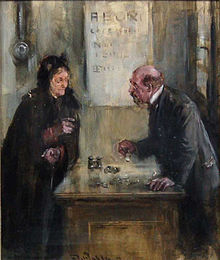Optician

Opticians specialize in the manufacture and adjustment of visual aids - usually glasses and contact lenses - as well as the incorporation of glasses into glasses frames. The practice of the profession includes the performance of eye tests , the measurement of the dioptric apparatus of the eyes , the determination and correction of optical ametropia , as well as the advice and support of the customer in the choice of the frame, lens types and aids such as reading devices and magnifying glasses for the visually impaired. The testing of both eyesight , for example , is also part of the range of services. At the same time, optometrists have the option of using screening tests to uncover abnormalities in the eye and then have these suspected diagnoses clarified by a specialist. Internationally, these tasks can be regulated differently by laws and professional codes . In Germany the qualification is divided into journeyman and master. The professional code of conduct means that a master craftsman is required to be present in every business premises. H. a foreman must be responsible and present to manage the business premises. Graduated engineers have the same rights as masters and are also allowed to run an operating facility. In the English-speaking world, masters are also called optometrists.
The manufacture of glasses frames made of metals and plastics, as well as the grinding of lenses is taught in training, but because of today's mostly industrial production, it is increasingly rarely used in practice. On the other hand, advice and evaluation of eye tests, also in connection with medication and other medical contexts for holistic advice on vision, is becoming increasingly important.
- Optometrist is a " mono professional " and therefore to-any professional group, examples, exceeded or subordinate.
Mobile optician
The proportion of people who need ophthalmic care at a very old age and / or with restricted mobility is increasing. Transporting the handicapped and nursing cases is usually associated with great effort and costs. For this group of people there are “mobile opticians” who adjust glasses for those affected at home, carry out advice on glasses and frames, check eyesight or select suitable magnifying glasses and other visual aids. This in no way replaces necessary consultations with an ophthalmologist, but enables the subsequent ophthalmic care in the personal environment and thus saves arduous journeys. However, not every optician offers such a service.
Situation in Germany
Industry overview
According to the 2019/2020 industry report by the Central Association of Opticians and Optometrists (ZVA) , 48,400 employees work in 11,550 specialist optical stores in Germany. The industry has 7,645 trainees with a significantly high proportion of women of 70%. The total turnover in the industry amounts to 6.497 billion euros and is growing by 3.8% compared to 2018. Taken together, the optical specialist companies sold 12.97 million pairs of glasses in 2019, 250,000 of which were sold online.
Dual education
Ophthalmic optics is a craft occupation with a three-year apprenticeship in the dual system . The content includes manual activities (grinding and assembly of spectacle lenses in frames, repairs of damaged glasses, etc.), organizational activities (order processing) and now primarily activities in customer contact (sales talks, complaint processing, etc.). The amount of the apprenticeship remuneration depends on the respective apprenticeship year: The first year of apprenticeship in Germany is remunerated at 325 to 550 euros, in the second year of apprenticeship between 475 and 610 euros, and in the third year of apprenticeship an aspiring optician receives between 550 and 720 euros Euro.
The final journeyman's examination is divided as follows:
- Extended journeyman's examination part 1 and part 2
- Theoretical examination part 1 and 2
Advancement training
In the optician trade , there is a need to become a master if you want to run a business and train apprentices. The master craftsman can take anyone who has passed the final examination to become an optician. Exam preparation courses at master schools last about a year full-time. Training courses at technical schools impart broader learning content and knowledge and last between one and two years. The degree of state-certified optician is awarded, which requires a broad ophthalmic knowledge, meanwhile also entitles to run an ophthalmic company, but not to train apprentices. Anyone who has purchased the conclusion of the state-certified optometrist, receives after successful additional drop of the master craftsman master craftsman . In some federal states, including Bavaria, the qualification as a state-certified optician entitles you to university entrance in the field of ophthalmic optics and optometry.
Situation in Austria
In Austria, the training content and required knowledge do not differ significantly from those in Germany. Ophthalmic optics is an apprenticeship with a 3½ year apprenticeship period. As in Germany, Austrian apprentices receive dual training in relevant industry companies (optician shops, optician chains) and at vocational schools. Related apprenticeships, such as precision opticians and hearing aid acousticians , can be completed with a shorter apprenticeship period. Apprentices complete their vocational training with the final apprenticeship examination and can train to become a master . The successful final apprenticeship examination also enables access to the vocational matura (vocational matriculation examination) and subsequently to further higher qualifications, e.g. B. at universities of applied sciences .
In Austria, too, there are admission requirements for the independent management of a specialist company. Like the trade of contact lens optics, ophthalmic optics is a regulated craft. Masters have to prove a two-year, subject-related professional activity. Graduates from master schools and specialized technical colleges (HTL) with professional experience are also permitted to take part in a company management.
Situation in Switzerland
In Switzerland , the optician EFZ ( French Opticien CFC , Italian Ottico AFC ) is a basic vocational training . It lasts four years and takes place in companies, the vocational school, and in inter-company courses. The course centers are located in Starrkirch-Wil ( Canton Solothurn ) and Lausanne ( Canton Vaud ). For higher qualifications - assuming professional maturity - a degree in optometry with training as an optometrist can be carried out at the University of Applied Sciences Northwestern Switzerland.
Up until 2007, there was a higher technical examination to become a qualified optician in Switzerland . The training was based on the apprenticeship and comprised four semesters of study.
See also
Web links
- Germany
- Federal Ministry of Justice - Ordinance on vocational training for opticians - as of 2011
- Optometrist / -in in Berufenet the Federal Employment Agency
- Central Association of Opticians (ZVA) - Federal Association of Guilds
- Optician training in Germany
- Austria
- Information about ophthalmic optics in Austria
- Training as an optician in the second educational path
- The professional group representation of the opticians of the Austrian Chamber of Commerce
- Professional and industry information from the Austrian Chamber of Commerce
- Switzerland
Individual evidence
- ↑ Industry report 2019/2020 of the ZVA - Central Association of Opticians and Optometrists (PDF download). Retrieved June 4, 2020.
- ↑ Training to become an optician. Retrieved February 13, 2018 .
- ^ Education and training information from the Institute for Economic Research: BerufsInformationsComputer (BIC) as of February 21, 2012
- ↑ Federal Law Gazette II No. 27/2003
- ↑ Information from the Swiss Opticians' Association
- ↑ Information from the Swiss Opticians' Association


